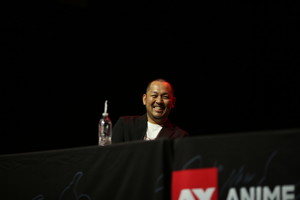Kaguya-sama: Love is War Producer Tatsuya Ishikawa
by Lynzee Loveridge, Kaguya-sama: Love Is War recently concluded its excellent third season. We checked in with Aniplex producer Tatsuya Ishikawa to discuss the standout episode 5 and his feelings on the show generally.
Kaguya-sama: Love Is War recently concluded its excellent third season. We checked in with Aniplex producer Tatsuya Ishikawa to discuss the standout episode 5 and his feelings on the show generally.
ANN: The episode 5 ED created a lot of buzz online. Why did you think Vercreek was a good fit for the director role, and what kind of discussions did you have with him about creating it?
Tatsuya Ishikawa: The first person who reached out and brought Vercreek on board was Mr. Kikuchi, the producer from A-1 Pictures. Mr. Kikuchi was interested because Mr. Vercreek is an exceptional illustrator, who has worked on big shows like Jujutsu Kaisen in Japan. He asked me “This person doesn't have experience directing, but I'd like to reach out. What you think?” So, I decided to check out his work and quickly realized that there was potential to do something really exciting if we had him handle the entire thing.
It was quite simple: to have him unleash his power to its fullest extent.
Since the theme was rap and because Mr. Vercreek is not Japanese, we told him to not be too concerned with staying culturally aligned with Kaguya-sama and do whatever he liked. We let him listen to the song and gave him free rein on the concept and design. What resulted was beyond amazing.
There wasn't any specific direction or requests, and the only thing we asked was that it was hip-hop and that it was cool. Only those two things. There may have been some requests during the animation production, but other than that, it was all up to him.
Hip-hop is experiencing a positive spotlight in multiple anime right now. Were there any unique considerations or staff brought in for these scenes and for writing the raps in episode five of season three?
The director, Mr. Hatakeyama, really likes music, specifically the American and British music scene from the eighties and nineties, so the show had quite a strong backbone when it came to music. Actually, there may be many things the Japanese anime viewers in their teens may not understand, but I felt we shouldn't worry too much about that. Entertaining things are going to be entertaining beyond generations. That is what culture is and it goes beyond borders. Our vision was to pursue anything and everything that was entertaining.
Kaguya-sama closed out its third season. What do you think has made the series so successful in Japan and abroad?
Beyond the core foundation that the original work (the manga) is very entertaining, I believe much of the success is due to the working environment where the staff, like the directors and animators, were given freedom to be creative and pursue the best at A-1 Pictures. Perhaps there were greater liberties on how things were portrayed than in the manga, and I don't think any interpretations were wrong, but how the adaptation was presented was incredibly unique, yet faithfully done. I think a big factor was that the show was created with everyone's dedication to cherish Kaguya-sama.
I think everyone who enjoys Kaguya-sama, not just in Japan but also overseas, can feel how much the show means to the staff.
Were there any particular challenges the team faced while working the latest season and how did they overcome them?
In the U.S., the season finale was streamed as two separate episodes, Episode 12 and Episode 13, but in Japan it was released as a one-hour episode. It was a challenge to have twice as much work for two episodes when we could've just ended the season with one episode. But Episode 12 and 13 felt much more enjoyable if you could watch it back-to-back, so we took on the challenge to go in that direction.
Furthermore, the song “Sentimental Crisis” plays during the climactic scene in Episode 13, and we wouldn't have been able to have that moment without the build up from season 1 to season 2 to season 3. Though it appears that the song was composed for that episode, it has been there from the beginning. To have the theme we had since season 1 carry through to the final climactic moment in the season 3 finale was a very happy challenge.
Is there a character's story you personally identify with or reminds you of your youth?
I'd have to say Ishigami's… or maybe that's who I should say. (laugh)
Actually, I really relate to how all the characters interact with each other in addition to each of their stories. In Japan, asking for someone's contact information can be seen as having a romantic interest or a sign of affection, particularly during one's teenage years. Thinking about these things—like the one in control when it comes to romantic relationships is... It's very common in Japan, so I can relate from an episodic standpoint, but in terms of characters, I like them all equally.
With that being said, since Ishigami and Miyuki Shirogane are the only main characters who are male, perhaps I identify most with Miyuki's dad. Not to come off too much like a parent, I can really relate with wanting someone to do what they want to do now, rather than later.